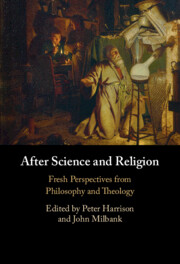Book contents
- After Science and Religion
- Reviews
- After Science and Religion
- Copyright page
- Contents
- Contributors
- Acknowledgements
- Introduction
- Part I Modern Historians on ‘Science’ and ‘Religion’
- Part II Beyond ‘Science and Religion’
- Part III Philosophical Problems with ‘Science’ and ‘Religion’
- Chapter 9 Consciousness, Intention, and Final Causation
- Chapter 10 The Problem of the Problem of Scientism
- Part IV Before Science and Religion
- References
- Index
Chapter 9 - Consciousness, Intention, and Final Causation
from Part III - Philosophical Problems with ‘Science’ and ‘Religion’
Published online by Cambridge University Press: 05 May 2022
- After Science and Religion
- Reviews
- After Science and Religion
- Copyright page
- Contents
- Contributors
- Acknowledgements
- Introduction
- Part I Modern Historians on ‘Science’ and ‘Religion’
- Part II Beyond ‘Science and Religion’
- Part III Philosophical Problems with ‘Science’ and ‘Religion’
- Chapter 9 Consciousness, Intention, and Final Causation
- Chapter 10 The Problem of the Problem of Scientism
- Part IV Before Science and Religion
- References
- Index
Summary
This chapter examines the importance of teleology (purposiveness) in the understanding of consciousness and nature. Goal-orientation is most evident in human conscious intention. However, this establishes a disjunction between conscious mind and wider nature; the latter, according to much modern science, is not purposive. How, then, does purposive mind arise in a non-purposive universe? It is argued that modern natural science rejects a particular variety of teleological explanation. More sophisticated varieties, particularly in Aquinas’s understanding of action and intention, can be recovered which do justice to our basic intuitions concerning the purposiveness of nature. However, modern natural philosophy rejects a number of metaphysical concepts which make teleological explanation intelligible. Amongst those concepts is ‘habit’. This chapter examines the Aristotelian natural philosophy of habit proposed by the nineteenth-century philosopher Félix Ravaisson. For Ravaisson, habit is a mediating category between matter and conscious intention which indicates that the goal-orientation of mind is, in an analogous sense, present throughout nature. This points to the possible recovery of a teleological understanding of nature, gleaned from a broad Aristotelian Thomism, which views creation as an expression of divine intention while avoiding crude accounts of teleology in modern design arguments for God’s existence.
- Type
- Chapter
- Information
- After Science and ReligionFresh Perspectives from Philosophy and Theology, pp. 219 - 231Publisher: Cambridge University PressPrint publication year: 2022

